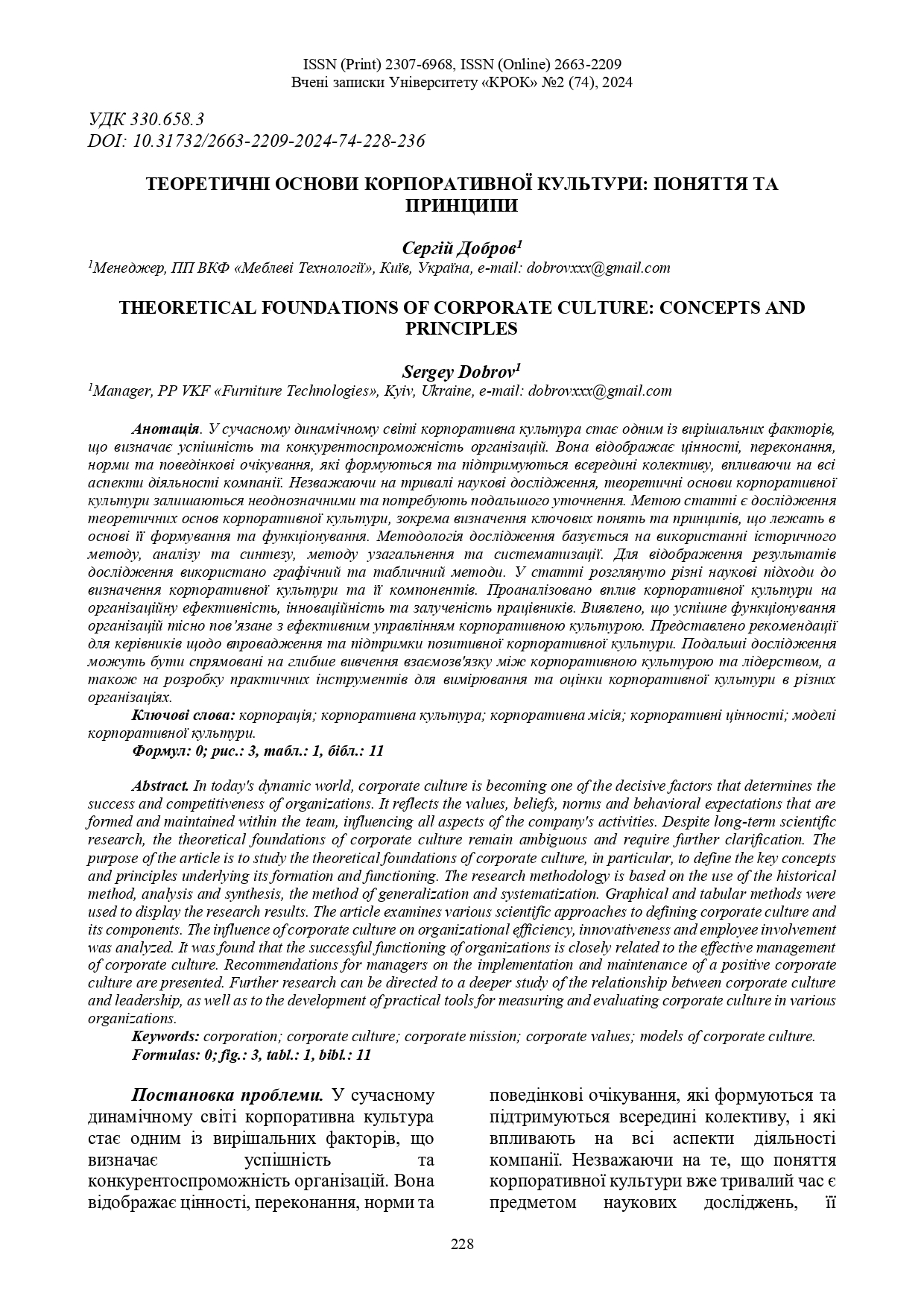THEORETICAL FOUNDATIONS OF CORPORATE CULTURE: CONCEPTS AND PRINCIPLES
DOI:
https://doi.org/10.31732/2663-2209-2024-74-228-236Keywords:
corporation, corporate culture, corporate mission, corporate values, models of corporate cultureAbstract
In today's dynamic world, corporate culture is becoming one of the decisive factors that determines the success and competitiveness of organizations. It reflects the values, beliefs, norms and behavioral expectations that are formed and maintained within the team, influencing all aspects of the company's activities. Despite long-term scientific research, the theoretical foundations of corporate culture remain ambiguous and require further clarification. The purpose of the article is to study the theoretical foundations of corporate culture, in particular, to define the key concepts and principles underlying its formation and functioning. The research methodology is based on the use of the historical method, analysis and synthesis, the method of generalization and systematization. Graphical and tabular methods were used to display the research results. The article examines various scientific approaches to defining corporate culture and its components. The influence of corporate culture on organizational efficiency, innovativeness and employee involvement was analyzed. It was found that the successful functioning of organizations is closely related to the effective management of corporate culture. Recommendations for managers on the implementation and maintenance of a positive corporate culture are presented. Further research can be directed to a deeper study of the relationship between corporate culture and leadership, as well as to the development of practical tools for measuring and evaluating corporate culture in various organizations.
Downloads
References
Балабанова, Л. В. Сардак, О. В. (2006). Управління персоналом. К.: ВД “Професіонал”, 512 с.
Крамаренко В. І., Холода Б. І. (2003). Управління персоналом фірми. К.: ЦУЛ. 312 с.
Щекин Г. В. (1999). Как эффективно управлять людьми: психология кадрового менеджмента. К.: МАУП. 400 с.
Argyris, C., & Schon, D. (1978). Organizational Learning: A Theory of Action Perspective. Addison-Wesley.
Collins, J. C., & Porras, J. I. (1994). Built to Last: Successful Habits of Visionary Companies. HarperBusiness.
Hofstede, G. (2011). Dimensionalizing cultures: The Hofstede model in context. Online readings in psychology and culture, 2(1), 8.
Johnson, G., & Scholes, K. (1993). Exploring Corporate Strategy. Prentice Hall.
Rousseau, D. M. (1990). Assessing Organizational Culture: The Case for Multiple Methods. In B. Schneider (Ed.), Organizational Climate and Culture. Jossey-Bass.
Schein, E. H. (1985). Organizational Culture and Leadership. Jossey-Bass.
Smircich, L. (1983). Concepts of Culture and Organizational Analysis. Administrative Science Quarterly, 28(3), 339-358.
Thurik, R., & Dejardin, M. (2011). The impact of culture on entrepreneurship. The European Business Review, (January-February), 57-59.

Downloads
Published
How to Cite
Issue
Section
License

This work is licensed under a Creative Commons Attribution-NonCommercial 4.0 International License.

